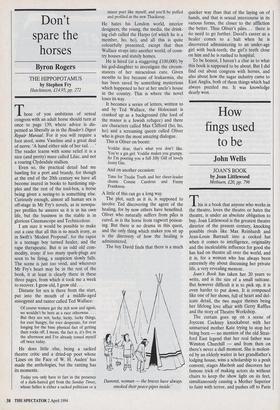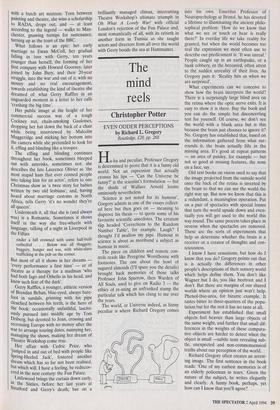How fings used to be
John Wells
JOAN'S BOOK by Joan Littlewood Methuen, £20, pp. 796 his is a book that anyone who works in
T
the theatre, loves the theatre or hates the theatre, is under an absolute obligation to buy. Joan Littlewood is the greatest theatre director of the present century, knocking possible rivals like Max Reinhardt and Jean-Louis Barrault into a cocked hat when it comes to intelligence, originality and the incalculable influence for good she has had on theatre all over the world, and it is, for a woman who has always been extremely shy about discussing her private life, a very revealing memoir.
Joan's Book has taken her 20 years to write, and is the size of a small suitcase. But however difficult it is to pick up, it is even harder to put down. It is composed like one of her shows, full of heart and del- icate detail, the two major themes being her lifelong love affair with Gerry Raffles and the story of Theatre Workshop.
The curtain goes up on a scene of Joycean Cockney knockabout with her unmarried mother Kate trying to stop her being born — no mention of the old Strat- ford East legend that her real father was Winston Churchill — and from then on there's never a dull moment. She is molest- ed by an elderly waiter in her grandfather's lodging house, wins a scholarship to a posh convent, stages Macbeth and discovers her famous trick of making actors do without chairs to keep the show light on its feet, simultaneously causing a Mother Superior to faint with terror, and pushes off to Paris With a butch art mistress. Torn between painting and theatre, she wins a scholarship to RADA, drops out, and — at least according to the legend — walks to Man- chester, gnawing turnips for sustenance, turning up as the toast of the BBC. What follows is an epic: her early marriage to Ewan McColl, her gradual falling in love with Gerry, ten years Younger than herself, the forming of her first company with Howard Goorney, later Joined by John Bury, and their 20-year struggle, into the war and out of it, with no money and no real encouragement, towards establishing the kind of theatre she dreamed of: what Gerry Raffles in an unguarded moment in a letter to her calls 'crashing the big time'.
Her public image at the height of her commercial success was of a tough Cockney nut, chain-smoking Gauloises, dropping her hat down the back of a chair while being interviewed by Malcolm Muggeridge and sticking her bottom into the camera while she pretended to look for It, effing and blinding like a trooper.
The effing and blinding continues throughout her book, sometimes bleeped out with asterisks, sometimes not: she describes the late Laurence Olivier as 'the most stupid ham that ever conned people into taking him for an actor', refers to one Christmas show as 'a twee story for babies written by two old lesbians', and, having heard about marriage customs in North Africa, tells Gerry 'it's no wonder they're all queers'.
Underneath it, all that she is (and always was) is a Romantic. Sometimes it shows itself in the way she free-wheels with language, talking of a night in Liverpool in the Fifties
under a hill crowned with some half-built cathedral . . . Below was all thuggery, buggery, hunger and war, with white-slave trafficking in the pub on the corner.
But most of all it shows in her dreams — every performance a first time' — or of theatre as a therapy for a madman 'who had both Iago and Othello in his head, and knew such fear of the dark'.
Gerry Raffles, a younger, athletic version of Brendan Behan, blue-eyed, always bare- foot in sandals, grinning with his pipe clenched between his teeth, is the hero of the book: occasionally unfaithful, lascivi- ously pursued into middle age by Tom Driberg, but devoted to Joan, crossing and recrossing Europe with no money after the war to arrange touring dates, nannying her, managing the shows, making her dream of Theatre Workshop come true.
Her affair with Cedric Price, who Jumped in and out of bed with people like Spring-Heeled Jack', fostered another dream which has so far not been realised, but which will, I have a feeling, be rediscov- ered in the next century: the Fun Palace.
Littlewood brings the curtain down early, lo the Sixties, before her last years at Stratford and Gerry's death, but on a
brilliantly managed climax, intercutting Theatre Workshop's ultimate triumph in Oh What A Lovely War! with official London's rejection of the Fun Palace and, most romantically of all, with its rebirth in another form in Tunisia as she taught actors and directors from all over the world with Gerry beside the sea at Hammamet.



























































 Previous page
Previous page